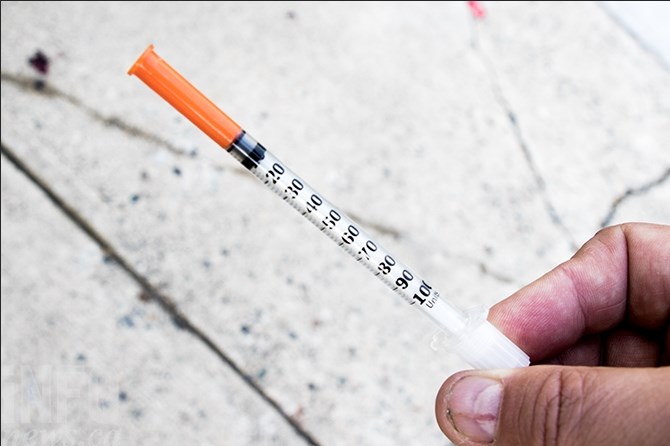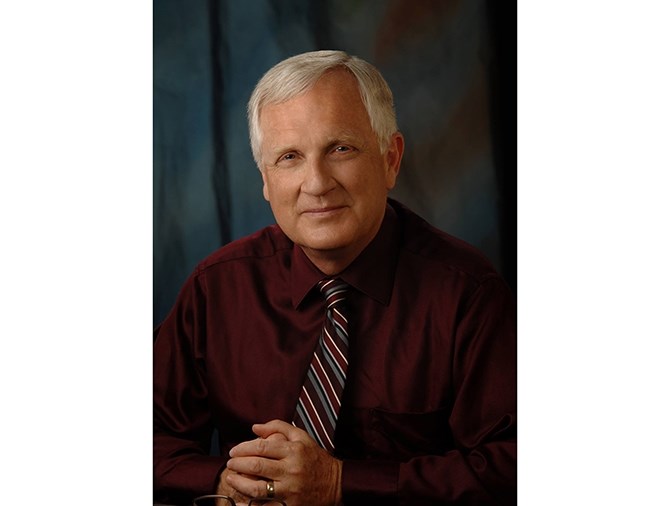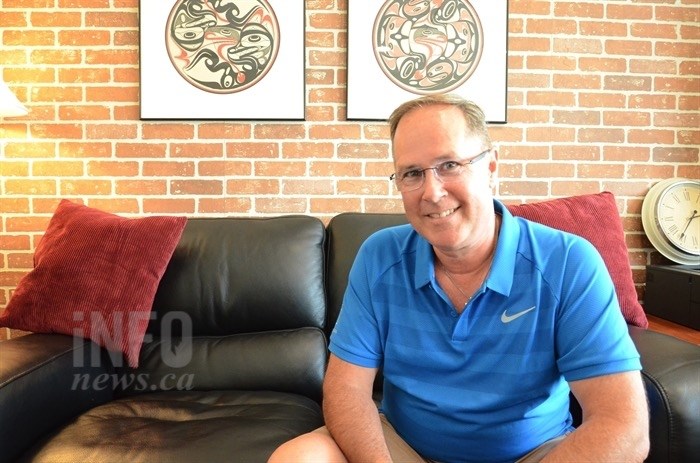
(SHELBY THEVENOT / iNFOnews.ca)
October 14, 2018 - 6:30 PM
VERNON - No issue has garnered more interest over the past few years like public safety, through discussions about things such as discarded needles, homeless camps and community impacts of drug use.
Of course, candidates have their opinions and plans going forward but we tried to see if we could simplify the question a bit. We wanted to know how candidates view the responsibilities of a city and a councillor, not necessarily themselves as a councillor.
This is one of those issues where candidates fall into two categories: Those who state, quite accurately, that city councils have few legislative tools at their disposal and many of the issues are provincial responsibility. Then there are those who acknowledge the constraints but look beyond the narrow confines of legislation to community activity and creativity.
We asked: Homelessness and drug issues including discarded needles has become a major issue in Vernon over the last four years. Does the City of Vernon share responsibility for this situation?
Here are key points from their answers, and at the bottom of the page you can see their full responses.
The city bears little responsibility…

Shawn Lee
Image Credit: Facebook
Shawn Lee: Does the City of Vernon share in the responsibility for this situation? Perhaps, but I think it is unfair to single out one jurisdiction and point the finger. IHA, Mental health, Social Services, and the RCMP all have dealings and responsibilities with this abiding social problem.
Victor Cumming (for mayor): The City’s mandate does not include housing the homeless or dealing with those with mental illnesses. Opioid misuse is a health problem. However, the City’s role is to support and encourage the agencies who are given the resources and implementation responsibility by the federal and provincial governments. The City also has a role to advocate for those senior government resources.
Teresa Durning: What we can do is continue to work with other levels of government pressuring for funding and support. My work to deliver the promise of my platform “to continue be an advocate for improved public safety within the city” will include me advocating support for housing, addiction & mental illness. The provincial government recently provided funding to Vernon for addiction and recovery, we need to continue actively seeking this type of support for our social issues.
Don Jefcoat: We need to work together with RCMP and empower Bylaw to do their jobs. Enforcing bylaws, provincial and federal laws regardless of how serious the offence or how insignificant it looks.
Rick Lavin: While Vernon sees its fair share of homelessness the city has been working with its partners to develop affordable housing units and emergency shelter beds... The issues have not substantially increased, rather the problem has become more visible due to Provincial and City decisions to move people who live outdoors from less visible areas to Linear Park.
Kevin Lepp: There are positive concrete solutions council can implement for the betterment of our whole community. Moving forward I would like to see municipalities across the region come together to develop a strategic plan that can be presented at the provincial level. This to secure further funding and resources that can be implemented in our local communities such as increased mental health beds, addictions/rehab and affordable housing.
Dalvir Nahal: Unfortunately, the failure to engage and start a dialogue with our local citizens and many downtown business owners sooner is something that was missed on our part. After much discussion on the needle issues the City of Vernon has funded a weekly cleanup program which in hindsight should have been done earlier. Reality is that under the local government act there is only so much we can do on a municipal level. However, that being said I believe in engaging with the police and stricter enforcement is needed especially when it comes to repeat offenders.
… but there’s more we can do

Darrin Taylor poses for a photo on Friday, July 30, 2018 in Vernon.
(BEN BULMER / iNFOnews.ca)
Darrin Taylor (for mayor): we must be creative in ways that we can increase the inventory of rental housing. It might make sense to designate areas of the city where secondary suites are legalized. I would also consider lobbying the provincial and federal government to provide incentives for families to provide rental suites or invest in rental properties.
Kelly Fehr: The city shares a responsibility with respect to its own staffing/funding levels. There has not been an adequate increase in the RCMP or Protective Services staffing levels until recently. Even when we see crime rates dropping in most categories we should not hold a hiring or funding increase freeze on essential services.
Jasmine Finlay: The City needs to develop a plan to support businesses who are continuingly facing litter on their property, in part due to proximity to service providers. There must be a cost effective balance struck, because taxpayers can’t be on the hook for clean-up on all private property but some assistance is clearly required.
Kari Gares: the City of Vernon does have a responsibility in the matter as they should have questioned the best practices, as implemented by IHA, sooner when the needs and protections of “other” citizens were being ignored, or seemingly ignored. They have a responsibility to bring all stakeholders to the table to deal with the situation and to find reasonable solutions to what many feels is an epidemic.
Gordon Leighton: I would be naïve or lacking in compassion or empathy if I thought the City did not share responsibility. We are a community. We share in the responsibility to keep Vernon safe and to do our best to collaborate with Interior Health, BC Housing, our many social service agencies and the RCMP to do as some communities in Alberta (Edmonton, Red Deer, Medicine Hat) have done – which is “housing first” with appropriate treatment and support to follow.
Dawn Tucker: As we’ve seen by the recent BC Housing funding to our city working with our nonprofits creates valuable dividends. We can look at our zonings to allow more densification in more places and add more laneway houses, carriage houses, row housing or duplexes and fourplexes. We should look to other communities such as Kelowna as a model where micro housing has already been built. As well as a council we can look to trade such things as parking variances to developers in exchange for some affordable housing units in their developments.
Okay…

Terry Vulcano
Image Credit: tvulcano.com
Terry Vulcano: Yes Vernon shares responsibility in not having addressed this issue sooner. As soon as the problem surfaced it should have been addressed, through devising solutions that could be tried for determining effectiveness, and not waited until it was a crisis.
Dave Deshane: Yes, the city does hold some responsibility. Grow operations and dispensaries all over town and some people see homelessness as a business model. Most communities do not have dispensaries, Vernon has an abundance. Our Very large Hearts created needed facilities like the Mission but we ended up with a magnet.
Sherrilee Franks: Of course! I am more concerned on how to move forward.
Jamie Morrow: I would be a very loud voice advocating to the provincial government to secure adequate funding to help get people off the streets and stay off the streets. This is bigger than this question.
Sam Zaharia: Continuously uprooting deeply insecure people triggers the hoarding response and ever-escalating self harm. It's almost as if the powers that be are trying to accelerate the ODs to eliminate the 'problem'. People are not problems.
These six candidates did not respond:
Scott Anderson
Art Gourley
Lily Kerr
Akbal Mund
Erik Olesen
Brian Quiring

Jasmine Finlay
Image Credit: Facebook
Full responses to the question: Homelessness and drug issues including discarded needles has become a major issue in Vernon over the last four years. Does the City of Vernon share responsibility for this situation?
Victor Cumming: The combination of homelessness, street populations and the opioid crisis issues are North American wide and very complex. These are obviously resulting in a North American wide challenge. If there was an easy approach Vancouver, Toronto, Calgary, Victoria, Kelowna, Kamloops, and many other cities far wealthier than Vernon, would have implemented it and succeeded. We all know from the news they have not. There is no easy answer. To suggest there is at best is naïve.
Clearly, the needs of the homeless is housing, with a continuum of supports, including harm reduction, treatment in various forms, re-integration, and complex mental health assistance. A complement of agencies, including City of Vernon, have spent many years building solid working relationships with the Provincial and Federal Ministries who are responsible for housing, addictions, and mental health. Mental Health and Addictions is a whole new provincial ministry. These are not municipal responsibilities. Making progress with senior governments has been slow. The recent $11 million commitment for supportive housing, more than 90 units plus upgrades to the former Howard House, will mean headway, finally. Of course, it is taking too long for the residents of Vernon and every other city. Senior governments dropped the ball and municipalities, residents, and businesses are caught dealing with the brunt of the issues.
It is important to remember that in Canada everyone is free to be in our parks and on our sidewalks, including congregating with their friends. Legally, reinforced by current court cases, homeless people can congregate in public places as can every Vernon resident and visitor.
The City’s mandate does not include housing the homeless or dealing with those with mental illnesses. Opioid misuse is a health problem. However, the City’s role is to support and encourage the agencies who are given the resources and implementation responsibility by the federal and provincial governments. The City also has a role to advocate for those senior government resources. The RCMP need to continue to focus their efforts on preventing and solving crime. The City does have jurisdiction for cleaning streets, alleys and sidewalks. Recent recommended programs designed to give special attention to collecting needles, and providing enhanced area supervision by Bylaw Enforcement for the downtown core are welcomed. The construction of the Portland Loo style public washrooms could have been completed earlier.
Dave Deshane: Yes, the city does hold some responsibility. Grow operations and dispensaries all over town and some people see homelessness as a business model. Most communities do not have dispensaries, Vernon has an abundance. Our Very large Hearts created needed facilities like the Mission but we ended up with a magnet. Mixed with the ease of getting drugs in Vernon it spiralled out of control. We have gone down the rabbit hole, it will be very hard to get out.
Teresa Durning: We’ve always had a homeless population here in Vernon. Speaking to individuals that have been here for over 25 years I am assured that we have always had homeless in Vernon. Most (if not all) other communities in British Columbia have a homeless population. It’s a lot more “out in front” of us now for a number of reasons. Vernon’s climate makes it a real draw for homeless as with the entire Okanagan Valley.
My thoughts around the needle issue is that the needles are a symptom of a bigger problem. The bigger issue being drug addiction within the City of Vernon. The only solution is treatment and recovery. Could Vernon have mitigated the fall out of a Canadian drug epidemic? I would guess no. What we can do is continue to work with other levels of government pressuring for funding and support.
My work to deliver the promise of my platform “to continue be an advocate for improved public safety within the city” will include me advocating support for housing, addiction & mental illness. The provincial government recently provided funding to Vernon for addiction and recovery, we need to continue actively seeking this type of support for our social issues.
Kelly Fehr: The city shares a responsibility with respect to its own staffing/funding levels. There has not been an adequate increase in the RCMP or Protective Services staffing levels until recently. Even when we see crime rates dropping in most categories we should not hold a hiring or funding increase freeze on essential services.
The city also shares responsibility in the area of housing/homelessness. I can commend the last two city councils actions overall in this area. They have been supportive and advocated for provincial and federal funding to address the housing crisis. They have supported city staff to fast track affordable housing, shelter and addictions recovery programs in Vernon. As our provincial government is finally prioritizing housing in BC our community/city staff is prepared and mobilized to take advantage of new housing funding streams. The City of Vernon’s responsibility is to ensure we take full advantage of the province’s housing initiatives.
With respect to substance misuse by people in our community. This is not an easy area for council to assist. Private treatment programs are expensive and out of reach for most people. There are not many of them in the North Okanagan. With respect to affordable, not for profit recovery programs Vernon has two plus one sober living house for a total of 38 beds for a population of 40,118. These two programs are partially funded by Interior Health. Does the City of Vernon share a roll in decreasing the level of addiction or substance misuse... they provide tax reductions for not for profit programs. I do not believe the city should increase taxes to provide or assist in funding addictions recovery programs. As health (addiction) falls under provincial and federal jurisdictions our council can and should play a roll of advocacy for its citizens.
Jasmine Finlay: Many communities are dealing with the same issues as Vernon. We are facing a housing crisis and an opioid epidemic. Municipal governments and City Councils should not be blamed for the fact that Provincial and Federal governments have failed to properly fund adequate mental health care and addictions treatment.
The outgoing Council has accomplished many positive steps forward, especially when it comes to housing. The fact that Vernon is about to build not just one, but two projects is an achievement we should all acknowledge.
Will those new units solve the homelessness problem in Vernon? No, of course not, the scale required is much broader, and we need to continue to work with the province and our community partners to improve housing options.
There are opportunities for improvement that I believe are key.
The City needs to develop a plan to support businesses who are continuingly facing litter on their property, in part due to proximity to service providers. There must be a cost effective balance struck, because taxpayers can’t be on the hook for clean-up on all private property but some assistance is clearly required.
On the housing crisis topic, I often hear people say “housing is not a municipal issue”, and that’s true to an extent. However there are steps municipalities can take to increase housing options. Allowing options such as laneway/carriage housing, and tiny homes will help mitigate the shortage. The tiny house talk I attended at the library was packed, so obviously there is a lot of public interest.
Removing some of the roadblocks to legalizing secondary suits is another solution.
I believe we can increase density in a thoughtful and responsible manner that is respectful of existing neighbours, and neighbourhoods.
Sherrilee Franks: Of course! I am more concerned on how to move forward.
Kari Gares: The issue of blatant drug use and lack of preventative measures, as it pertains to used needles, does fall solely on IHA and the Provincial Government. With that said, the City of Vernon does have a responsibility in the matter as they should have questioned the best practices, as implemented by IHA, sooner when the needs and protections of “other” citizens were being ignored, or seemingly ignored. They have a responsibility to bring all stakeholders to the table to deal with the situation and to find reasonable solutions to what many feels is an epidemic. It is a contentious issue at best and one many of us barely understand but it shouldn’t be left to a point where now it is impacting businesses, our seniors and our youth. The City has a responsibility to protect all of its citizens and not just those that are most at risk.
Don Jefcoat: When we talk about homeless we are often talking about the street entrenched population. All stakeholders share some level of responsibility including the city. We have allowed the street entrenched to push boundaries for far to long. Even the current council has dropped the ball. They spent the first 2 to 3 years denying the problem, then only when forced to pull their heads out of the sand they put the Activate Safety Task Force. We need to work together with RCMP and empower Bylaw to do their jobs. Enforcing bylaws, provincial and federal laws regardless of how serious the offence or how insignificant it looks.
Rick Lavin: Homelessness and drug issues have erupted across Canada and BC; Vernon has not been spared from the issue. Experts at every level have been working on this issue and progress has been made. While Vernon sees its fair share of homelessness the city has been working with its partners to develop affordable housing units and emergency shelter beds. Vernon Native Housing and Turning Points Collaborative along with BC Housing have several projects underway with units coming available by spring. The issues have not substantially increased, rather the problem has become more visible due to Provincial and City decisions to move people who live outdoors from less visible areas to Linear Park.
Shawn Lee: Homelessness, illicit use of drugs, and associated criminal activities, are not new to our city but certainly has come to a head recently. Does the City of Vernon share in the responsibility for this situation? Perhaps, but I think it is unfair to single out one jurisdiction and point the finger. IHA, Mental health, Social Services, and the RCMP all have dealings and responsibilities with this abiding social problem.
Perhaps the City could be held accountable for not making their request for help more urgent and timely. Recent activity by the Activate Safety Task force brought the seriousness of the problem faced by members of our community to the forefront. This increased awareness will hopefully lead to some positive measures by those with the mandate to protect all members of our community.
As a member of council I would support an effort by Council to bring interested parties together to seek to ameliorate the situation. The recent task force itself recognized the paucity of input from such invaluable groups as the IHA, Mental Health or the Vernon Social Planning Council. This social problem with have no quick and easy solution but with the goodwill and cooperation of all, some solutions will surely be found.
Gordon Leighton: The root causes of homelessness and addictions are best explained by the many social agencies who try to address the issue. The iNFOnews.ca question made no reference to mental health issues, which is a contributing factor to addictions and which in many cases can impair a person’s ability to secure employment or to live a dignified life when there is no place to call home.
I would be naïve or lacking in compassion or empathy if I thought the City did not share responsibility. We are a community. We share in the responsibility to keep Vernon safe and to do our best to collaborate with Interior Health, BC Housing, our many social service agencies and the RCMP to do as some communities in Alberta (Edmonton, Red Deer, Medicine Hat) have done – which is “housing first” with appropriate treatment and support to follow.
As a community, we could have done better in creating affordable housing. The current situation is a legacy of the current Mayor and Council, who have thus far been ineffective in leadership on this issue. As evidence of the community’s dissatisfaction, there are twenty persons in the Council race and four for the Mayor’s chair. Is it time to start with a clean slate and retire the incumbents?
Kevin Lepp: Homelessness and drug issues rose to the forefront when city council voted to allow camping in public parks without limits (May 2017) to align with BC Supreme Court ruling (2015) permitting homeless right to public space. Although the intention of council seemed good, simply allowing people to camp in public parks did not address the root issues of homelessness, mental health and addiction. It did further highlight the issue with numerous camps popping up in various sites throughout city most visibly Linear Park along 25th Ave. There are positive concrete solutions council can implement for the betterment of our whole community. Moving forward I would like to see municipalities across the region come together to develop a strategic plan that can be presented at the provincial level. This to secure further funding and resources that can be implemented in our local communities such as increased mental health beds, addictions/rehab and affordable housing.”
Jamie Morrow: I don’t go into the past and this is a major issue in most communities. What I can add is that I would only be one voice if elected on October 20th but I would be a very loud voice advocating to the provincial government to secure adequate funding to help get people off the streets and stay off the streets. This is bigger than this question.
Dalvir Nahal: Homelessness and Drug Issues are a top priority for many cities across Canada. If there was a magic wand to fix this issue, we would have done so. With an increase in housing prices, low vacancy rates and cutbacks from higher levels of governments Vernon along with many Okanagan municipalities have found themselves dealing with the aftermath. Much discussion and advocacy was being had behind the closed doors with social service agencies, and other levels of government which ultimately led to 11 million dollars being brought in for social housing. Unfortunately, the failure to engage and start a dialogue with our local citizens and many downtown businesses owner’s sooner is something that was missed on our part. After much discussion on the needle issues the City of Vernon has funded a weekly cleanup program which in hindsight should have been done earlier. Reality is that under the local government act there is only so much we can do on a municipal level. However, that being said I believe in engaging with the police and stricter enforcement is needed especially when it comes to repeat offenders.
Darrin Taylor: Vernon is not alone in facing this problem. However, that does not mean that we throw up our hands and do nothing. We can and must do better than that. Instead of dwelling on the past, I would like to shift the conversation to what we can do now. When I hear it suggested that the problem is homelessness, I push back. It is much more complicated than that. Firstly, the vast majority of homeless do not cause harm or commit crimes and many are not drug addicted. For that population, low income subsidized housing cannot come soon enough. Beyond government grants (which we know do not come from a bottomless pit of money) we must be creative in ways that we can increase the inventory of rental housing. It might make sense to designate areas of the city where secondary suites are legalized. I would also consider lobbying the provincial and federal government to provide incentives for families to provide rental suites or invest in rental properties.
Some of the people on our streets are chronically addicted and, if clinically assessed, would certainly require admission to residential addiction treatment with medical and psychiatric care. Once stabilized, housing would then become a priority for those patients.
Part of the subsidized housing strategy is to provide a combination of both since some patients could be housed and provided clinical support through wrap around services.
Then there is a segment living on the streets who will rebuff offers of help and perhaps engage in unlawful disruptive behaviour. The RCMP tell us that the number of prolific offenders who fall into this category number in the dozens. Enforcement and an unwillingness to tolerate unlawful behaviour becomes essential to maintain safety for families, seniors, businesses and the rest of civil society.
Dawn Tucker: We are in the midst of an opioid crisis and a housing crisis. We are facing challenges as a community. As a city we need to listen to our residents and we can give a regular opportunity for citizens to give feedback to city council. This form of feedback can be in the form of town halls or offering open time for residents to be heard at city council meetings. We can strengthen our community relationships with others. As we’ve seen by the recent BC Housing funding to our city working with our nonprofits creates valuable dividends. We can look at our zonings to allow more densification in more places and add more laneway houses, carriage houses, row housing or duplexes and fourplexes. We should look to other communities such as Kelowna as a model where micro housing has already been built. As well as a council we can look to trade such things as parking variances to developers in exchange for some affordable housing units in their developments. We should look to any opportunities to obtain funding not just for housing but also for treatment, detox as well lessening the impact of opioid use in our community. We can support council’s recent decision to add a response program modeled after Spikes on Bikes in use in Vancouver. We can continue to build a conversation with IHA on their harm reduction strategies and above all we need to be open to ideas and methods that will aid these challenges we are facing in Vernon.
Terry Vulcano: Yes Vernon shares responsibility in not having addressed this issue sooner. As soon as the problem surfaced it should have been addressed, through devising solutions that could be tried for determining effectiveness, and not waited until it was a crisis.
Sam Zaharia: Continuously uprooting deeply insecure people triggers the hoarding response and ever-escalating self harm. It's almost as if the powers that be are trying to accelerate the ODs to eliminate the 'problem'. People are not problems. Not one of us is here without a purpose. Btw, eliminating the old sex workers only makes room for new ones, and where does a 'fresh' sex worker come from? She's got to be somebody's baby.
Have your say in the comments section below.
To contact a reporter for this story, email Shelby Thevenot or call 250-819-6089 or email the editor. You can also submit photos, videos or news tips to the newsroom and be entered to win a monthly prize draw.
We welcome your comments and opinions on our stories but play nice. We won't censor or delete comments unless they contain off-topic statements or links, unnecessary vulgarity, false facts, spam or obviously fake profiles. If you have any concerns about what you see in comments, email the editor in the link above.
News from © iNFOnews, 2018